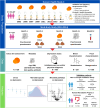F. prausnitzii potentially modulates the association between citrus intake and depression
- PMID: 39543781
- PMCID: PMC11566247
- DOI: 10.1186/s40168-024-01961-3
F. prausnitzii potentially modulates the association between citrus intake and depression
Abstract
Background: The gut microbiome modulates the effects of diet on host health, but it remains unclear which specific foods and microbial features interact to influence risk of depression. To understand this interplay, we leveraged decades of dietary and depression data from a longitudinal cohort of women (n = 32,427), along with fecal metagenomics and plasma metabolomics from a substudy (n = 207) nested in this cohort, as well as an independent validation cohort of men (n = 307).
Results: We report that citrus intake and its components are prospectively associated with a lower risk of depression and altered abundance of 15 gut microbial species, including enriched Faecalibacterium prausnitzii. In turn, we found a lower abundance of F. prausnitzii and its metabolic pathway, S-adenosyl-L-methionine (SAM) cycle I in participants with depression. To explore causality, we found that lower SAM production by F. prausnitzii may decrease intestinal monoamine oxidase A gene expression implicated in serotonin and dopamine synthesis.
Conclusions: These data underscore the role of diet in the prevention of depression and offer a plausible explanation for how the intestinal microbiome modulates the influence of citrus on mental health. Video Abstract.
Keywords: Citrus fruits; Depression; Gut microbiome; Metabolomics; Metagenomics; Transcriptomics.
© 2024. The Author(s).
Conflict of interest statement
Figures



References
-
- Depressive disorder (depression) [https://www.who.int/news-room/fact-sheets/detail/depression#:~:text=Depr....]
-
- Schaub A-C, Schneider E, Vazquez-Castellanos JF, Schweinfurth N, Kettelhack C, Doll JPK, Yamanbaeva G, Mählmann L, Brand S, Beglinger C, et al. Clinical, gut microbial and neural effects of a probiotic add-on therapy in depressed patients: a randomized controlled trial. Transl Psychiatry. 2022;12:227. - PMC - PubMed
-
- Rush AJ, Trivedi MH, Wisniewski SR, Nierenberg AA, Stewart JW, Warden D, Niederehe G, Thase ME, Lavori PW, Lebowitz BD, et al. Acute and longer-term outcomes in depressed outpatients requiring one or several treatment steps: a STAR*D report. Am J Psychiatry. 2006;163:1905–17. - PubMed
-
- Li Y, Lv MR, Wei YJ, Sun L, Zhang JX, Zhang HG, Li B: Dietary patterns and depression risk: A meta-analysis. 2017. - PubMed
MeSH terms
Substances
Grants and funding
LinkOut - more resources
Full Text Sources
Medical

